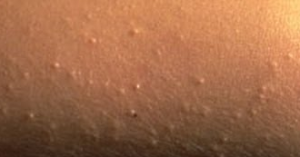An itchy skin can result from many conditions. In many cases, a small part of your skin will feel itchy for a short period of time while in some cases a larger part of your skin will be affected by the itchiness. The experience of itchiness can vary from mild to serious skin irritation, thus making the skin feel very itchy; however there are cases where there may be no rash present.
Causes of an itchy skin with no rash
- Allergic reactions– Substances such as soap, wool and chemicals cause the skin to be irritated and start feeling itchy. Foods such as eggs that one is allergic to, makes one feel itchy.
- Drugs – Reactions to narcotic pain relievers, antibiotics can cause itching all over the body.
- Kidney failure– This is the destruction of the kidney, it is mostly caused by either diabetes or high blood pressure making the kidneys function abnormally. This makes blood partly acidic due to the body developing acidosis. This leads to skin itchiness without rash development. It is accompanied with other effects such as fatigue, general body weaknesses plus frequent urination.
- Lymphoma – This is a cancer that affects the lymphatic system and spreads into the blood. It can start as non-Hodgkin and Hodgkin lymphoma. This cancer causes an itchy skin but no developing rash, fatigue and weight loss.
- Dry skin- Xerosis is a condition in people with dry skin; however there are no signs of rash. It is not a serious condition but it makes one uncomfortable. In this condition, your skin will feel taut, appear shrunken and stretched. There are also signs of peeling and severe itching.
- Development of cholestasis when pregnant– It is a disease that develops during the last months of pregnancy. It causes bile from gallbladder to flow to the kidneys thus being altered by the hormones. This leads to elevated condition of bile acid in the liver making it to flow to the bloodstream. This will cause itchy conditions but no developing rash.
- Scabies– Mites are the major cause of this condition. They burrow into human skin making the affected place become itchy. This itchiness becomes more severe at night. Scabies are contagious and spreads through the sharing of items such as bedding, clothing and towels.
Home remedies
Proper diet – One should drink water regularly or eat juicy fruits, drink soup or fruit juices, eat green leafy vegetables and reduce the intake of pineapples and mangoes as these increases the itchiness.
Moisturizing cream– Application of a moisturizing cream on itchy parts can help relieve the pain. Search for products rich in Cetaphil, Verave, Vanicream and Eucerin.
Anti-itch Cream or Lotion– Tthese creams temporarily relieve the itchiness. Antihistamines can also be taken to relieve the itchiness of the skin
No scratching – after using the cream one may feel prickly but you should try not to scratch, as it can cause severe damage. Observe the use of your nails by keeping them short.
Cool bath– Soothe your skin with the use of colloidal ointments, uncooked oatmeal or baking soda on your skin when taking a shower. This helps keep your skin moist.
Proper clothing– Put on cotton clothes, they reduce the rate of skin irritation.
Mild soaps– Avoid soaps with dyes or perfumes that irritate your skin. Rinse off soaps from your body and apply a moisturizer to keep your skin moist.
During the recovery period, itching can be accelerated by stress, practice calm breathing, and rest more. This can be stressing but once your body is calm from this bothersome state. These symptoms might disappear completely.
Using a mild detergent for laundry– Use detergents that are mild when washing bedding, towels and clothes. Remove as much soap as possible from the laundry clothes as they may be the cause of skin irritation
Medical treatments
- Use antihistamines- They relieve skin allergies.
- Apply a corticosteroid cream and cover the itchy part with a wet cotton to help the skin absorb the medication
- Treat the underlying condition- If the itchiness is brought by kidney failure, diabetes or thyroid problems, then this condition have to be dealt with to easy the symptoms.
- Light therapy- Itchiness can be controlled during phototherapy when you are exposed to different ultraviolet wavelengths.
- Temporary relief- Ointments are used as a substitute when the itching is resistant to treatment. Lotions with calamine, menthol, camphor, benzocaine and lidocaine are helpful.
Visiting your Doctor
If you feel like there is no improvement after a period of two weeks of itching and you cannot define the cause of your itchiness, feel free to consult your doctor if there are other signs that accompany your itchiness such as weight loss, bowel habits, skin redness and extreme tiredness you should share with your doctor.
